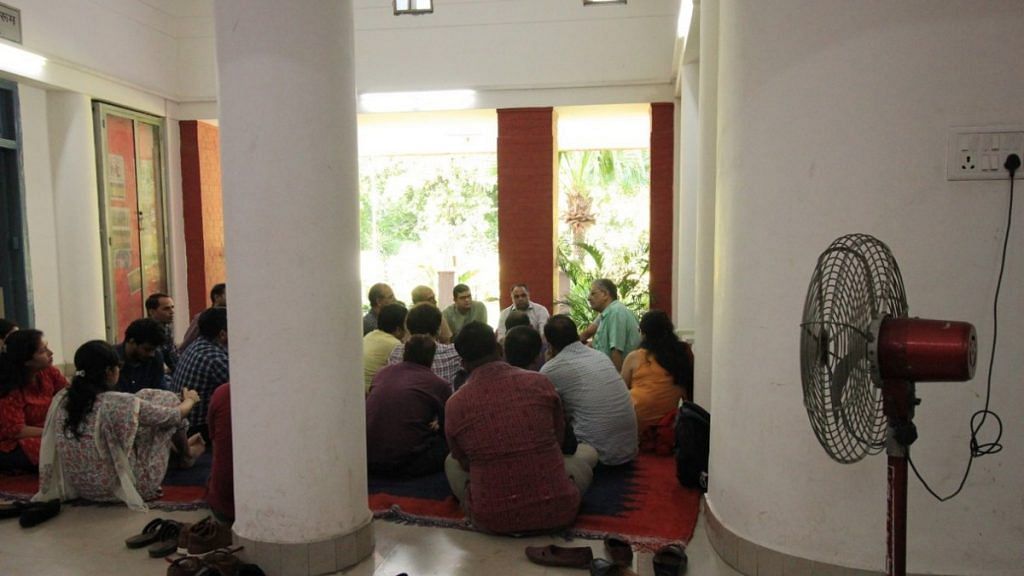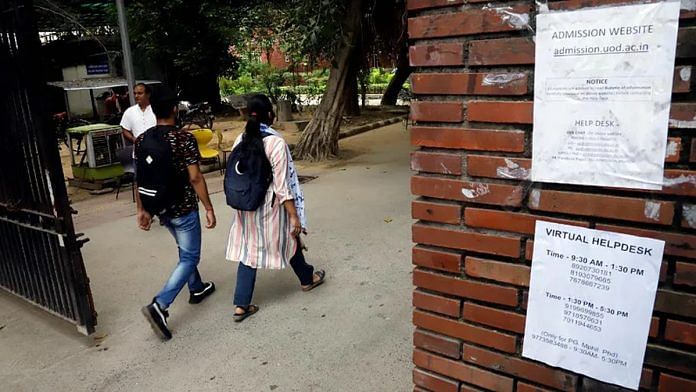New Delhi: Preeti Gupta devoted five years of her life to teaching mathematics at Delhi University’s Deshbandhu College. But the length of her service did nothing to offset the ‘temporary’ nature of her employment. Like dozens of other ad hoc or contractual professors, she did not make the cut during DU’s ongoing interviews to hire ‘permanent’ teachers, and is now without a job.
“I have taught in DU as an ad hoc professor for 12 years in all. I was deemed to be fit for the teaching position every year and then suddenly, one day, I just stopped being fit? This thoughtless move has not only put my personal life and finances into jeopardy, but has damaged my reputation as an academic,” 40-year-old Gupta said.
Wherever she applies now, “the one question that every college asks is, ‘Why were you removed?’,” she added.
Gupta is not alone in her misery.
Since recruitment began in September, teachers claim, over 50 ad hoc professors have been dismissed from DU colleges like Hansraj, Lakshmibai, Daulat Ram, Deshbandhu and Ramjas. And many more are likely to face the axe. Several of them told ThePrint they felt wounded that their long associations with their college — over a decade, in some instances — amounted to nothing.
Many are also angry, and allege that the selection process is unfair, opaque and influenced by political factors. They are demanding some consideration should be given to their years-long service for appointments to the permanent faculties of colleges.
Last Saturday, several professors, backed by some students, agitated at Ramjas College while the meeting of the selection committee was being held, prompting the Delhi University’s Principals’ Association to raise concerns about security arrangements during the recruitment exercise.
When asked about the concerns of ad hoc teachers, DU registrar Vikas Gupta said the ongoing process was “fair” and in accordance with the norms of the University Grants Commission (UGC).
The UGC Regulations, 2018, do not have any provision for the regularisation of the services of temporary/ad hoc teachers on a permanent basis through one-time absorption.
“There is no provision for absorption of ad hocs. If we even considered it, it would be a violation of various articles in DU’s constitution,” the registrar added.
Understaffing though, is a chronic problem in central varsities, especially DU.
In July, the Union government had told Parliament that DU had 900 vacant faculty positions, the highest among all central universities. Another Lok Sabha reply by the Ministry of Education revealed that DU employs more contractual faculty (1,044) than any other central varsity.
The Ministry of Education had directed all central universities to fill their vacancies on “mission mode” within a year, starting from September 2021, leading to the ball rolling on making new hires.
DU, particularly, has a lot of catching up to do. Very few new hires have taken place since 2010, at first attributed to teacher selection criteria not being set, and then due to delays for various reasons, like the pandemic in 2020 and, before that, a controversy over the UGC’s directive to use a new formula for reservations in teaching posts in 2018.
With the massive faculty shortage, ad hoc teachers have played an important role in keeping classes going across colleges in DU, but many complain they have got the short end of the stick.
Also read: Over 6 lakh applicants for 70,000 seats – Delhi University launches its admission portal
Fully qualified, but no benefits or security
All ad hoc teachers working in DU have the academic qualifications required to be a college professor and have cleared the UGC’s National Eligibility Test (NET).
These professors are appointed for a maximum of four months and if the requirement persists beyond that — which it generally does — a college can continue with the service of the teacher after giving them a notional break of one day.
While they are paid starting salaries on par with permanent teachers (which professors ThePrint spoke to said was Rs 80,000 to Rs 1 lakh), they do not get yearly increments and no benefits like PPF or health insurance. They also get only four permitted leaves in four months.
Many ad hoc professors have taught for years at their colleges and have been pushing for a while for absorption into the permanent faculty. The current recruitment drive has come as a slap on the face, several professors said. They claimed that a massive removal of ad hoc professors is underway, although colleges have kept the exact numbers under wraps owing to fear of a backlash.
“We have been demanding for the absorption of adhoc and temporary faculty who have been churning out batches after batches of meritorious students for so many years. Under no circumstances should they be displaced,” said professor Mithuraaj Dhusiya of Hansraj College, who is a member of DU’s Academic Council.
He added that the fact that these teachers “have been forced to teach in a temporary position for 10 years” reflects a systemic failure.
“Since they are attuned to the needs and demands of the university, these professors should be given a chance to be interviewed first over new candidates,” he added.
For many ‘displaced’ ad hoc teachers, their plight is humiliating and future highly uncertain.
“We might have to start looking towards private universities for jobs,” said an ad hoc professor who has been teaching at the Delhi School of Economics for over a decade. He declined to be named.
Another ad hoc professor, who also wished to remain anonymous, said: “We are in such a precarious situation that we cannot even raise our concerns. We are still applying for vacant positions in other colleges. If one college doesn’t want us as a permanent faculty, we have no other option but to try our luck in other colleges,” he said.

Allegations of ‘politics’, ‘nepotism’
Many of the ad hoc professors ThePrint spoke to alleged that the recruitment process was being conducted in an unfair manner and that ad hoc teachers were being cast aside in favour of ‘outsiders’ from other universities for reasons ranging from nepotism to their political alignment.
Some professors alleged that more “right-leaning” faculty members were deliberately being brought in from institutes like University of Allahabad and Banaras Hindu University. Prof Abha Dev, a former Executive Council member of Delhi University, claimed that this was being done to change the “direction and thought process” of the university.
Last year, notably, there had been some buzz over the appointment of Yogesh Singh as the Vice-Chancellor of DU since he was considered to have close links with the Bharatiya Shikshan Mandal, the teachers’ wing of the Rashtriya Swayamsevak Sangh (RSS).
Meanwhile, some teachers allege that the bigger problem is nepotism.
Preeti Gupta, for instance, claimed that she was replaced by the son of a principal of another college. Other ad hoc professors alleged that being hired depended on whether or not a candidate could get a glowing recommendation from higher placed DU faculty members, rather than their track record.
Professors have also claimed that during the interviews being held at Hansraj College, they were not allowed to take in any material possessions including their thesis, watches, and mobile phones. They also alleged that some candidates were given less time than others during interviews.
On these allegations, DU registrar Vikas Gupta said: “As per my knowledge there is no favouritism afoot in the selection process. Many professors from other colleges have been appointed in DU and several professors from our departments have moved to different colleges.”
When ThePrint visited Ramjas College this Friday, a group of ad hoc teachers were holding a small protest over the recruitment process. They were also upset for another reason: the appointment of Professor Kamal Jaiswal of Lucknow’s Babasaheb Bhimrao Ambedkar University as the expert interviewer for teachers in the zoology department. Back in 2016, he had been accused of making casteist comments and harassing students.
When asked about this, Vikas Gupta said that there was nothing untoward about having Jaiswal as the interviewer. “We are given a list of panel experts by the UGC. We select professors as per the guidelines issued,” he said.
(Edited by Asavari Singh)
Also read: How universities are being renamed under Modi govt as focus shifts from ‘Gandhi, Nehru’



